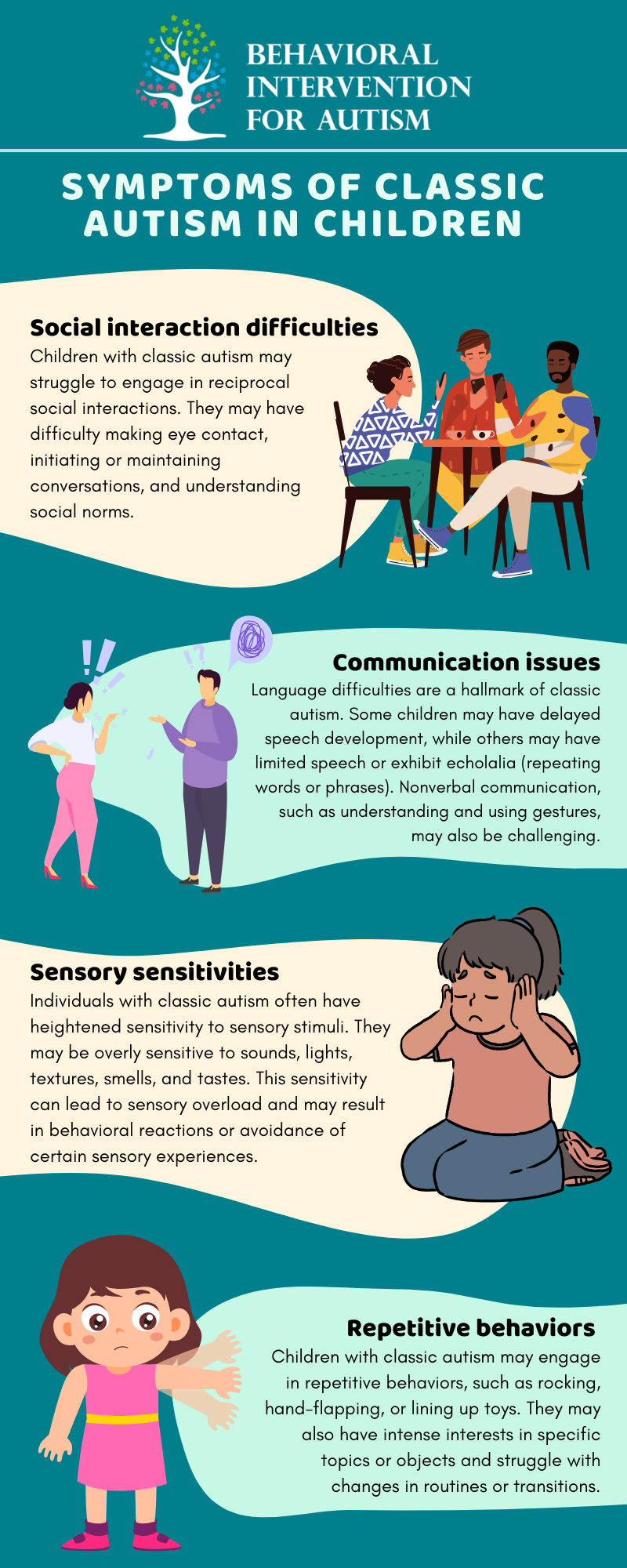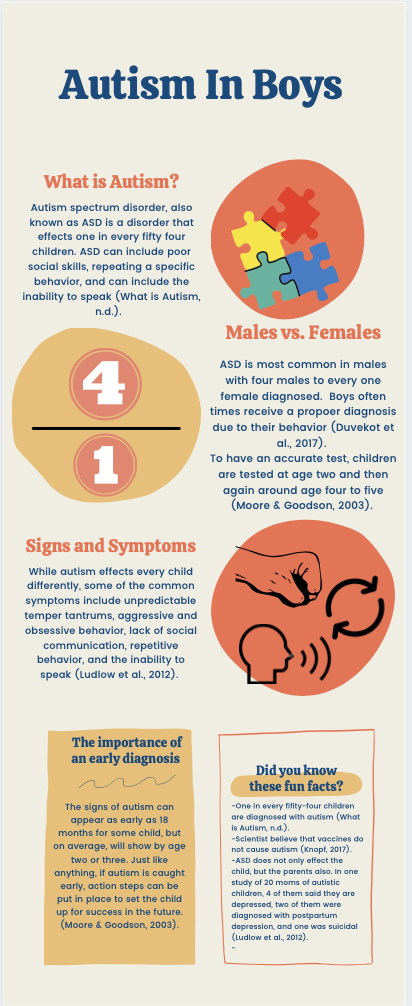What to expect when working with an Autism Behavioral Therapy program practitioner
What to expect when working with an Autism Behavioral Therapy program practitioner
Blog Article
Understanding the Impact of Behavioral Autism on Day-to-day Live and Social Communications
You may not recognize exactly how deeply behavior autism influences daily life and social communications. People on the range often navigate a world filled up with interaction hurdles and sensory overload. These challenges can lead to irritation and seclusion, affecting their partnerships and total health.
Specifying Behavior Autism and Its Attributes
Behavior autism, usually referred to as autism range problem (ASD), includes a series of conditions identified by challenges in social interaction, communication, and repetitive habits. You might see that individuals with ASD often struggle to analyze social signs, which can bring about misunderstandings in conversations. They might discover it difficult to develop eye call or engage in tiny talk, making social circumstances feel frustrating.
Communication troubles can show up in different means, from delayed speech development to a preference for making use of less words. By identifying these traits, you can promote an environment that promotes acceptance and urges reliable interaction, helping individuals with autism grow in their daily interactions.
The Spectrum of Autism: Understanding Irregularity in Habits
Autism range condition (ASD) isn't a one-size-fits-all diagnosis; it varies extensively among people. You could discover that some individuals with ASD exhibit light signs and symptoms, while others may face a lot more substantial difficulties. This irregularity can materialize in habits, interests, and sensory sensitivities. You might encounter people who are extremely verbal and engage quickly in discussions, while others may prefer singular tasks or communicate non-verbally.
Moreover, the means individuals with ASD react to sensory input can vary considerably; some may be bewildered by loud noises or bright lights, whereas others prosper in boosting environments. The range also includes distinctions in social communications; some people may battle to interpret social signs, while others navigate social setups with family member simplicity. Understanding this irregularity is necessary, as it aids you appreciate each person's distinct experience and dressmaker support to their specific needs, promoting a much more inclusive setting for everybody.
Communication Obstacles Encountered by People With Autism
When you communicate with individuals on the autism spectrum, you might observe their one-of-a-kind communication challenges. They frequently deal with problems with both spoken and nonverbal signs, which can impact their social communications. Understanding these barriers is essential for fostering far better links and support.

Verbal Communication Problems
Several people on the autism spectrum experience spoken interaction difficulties that can substantially influence their daily communications. You could locate it challenging to reveal your ideas, feelings, or requires clearly. This can bring about aggravation for both you and those around you, as misconceptions take place. You might deal with starting discussions, maintaining a topic, or recognizing nuances in speech. Typically, you may prefer using straightforward language or recurring expressions, which can restrict your ability to participate in deeper conversations. Your volume, pace, or tone could not straighten with social assumptions, triggering others to misinterpret your intentions. Recognizing these difficulties can help you and your assistance network create strategies to boost communication and cultivate much better connections with others in your every day life.
Nonverbal Interaction Barriers
Verbal communication isn't the only difficulty people on the autism range face; nonverbal interaction barriers can be simply as considerable. These difficulties can lead to misunderstandings or misconceptions of social signs, making interactions really feel frustrating or complicated. By attending to nonverbal communication, you can find methods to enhance your social experiences and improve your general high quality of life.
Social Communication Influences
Social communications can commonly feel frustrating due to the special interaction obstacles dealt with by people with autism. You may deal with interpreting social hints, making it hard to understand mockery or body language. This can result in misunderstandings or unpleasant moments in conversations. In addition, launching and keeping conversations may feel difficult, triggering stress and anxiety in social scenarios. You may like structured atmospheres, making spontaneous communications uncomfortable. It's likewise typical to experience trouble in engaging in little talk, which can prevent forming brand-new friendships. Recognizing these challenges can aid you discover approaches to enhance interaction, such as exercising social abilities in secure settings or making use of visual help - Autism Behavioral Therapy. Recognizing your requirements allows you to navigate social interactions with greater confidence and simplicity.
Social Communication and Partnership Building in Autism
While building connections can be testing for individuals with autism, recognizing their distinct point of views and interaction designs can cultivate meaningful links. You might observe that many people on the spectrum choose direct interaction and may have problem with social cues or small talk. By being simple in your interactions, you can help develop an atmosphere where they feel comfy.
Involving in shared interests can additionally offer as a bridge to much deeper connections. Whether it's a hobby, a favored program, or a shared enthusiasm, these usual strings can open up doors to relationship.
Daily Life Routine: Browsing Approaches and challenges
Maneuvering daily life routines can be especially testing for people with autism, especially when unanticipated modifications occur. To browse these difficulties, think about applying aesthetic timetables or lists.
Developing a regimen that consists of sensory breaks can also be beneficial. You can prepare time-outs throughout your day to charge. It's essential to communicate with those around you, allowing them understand your requirements and preferences. This assists develop an understanding setting.
Last but not least, practice mindfulness methods to manage stress and anxiety and anxiety. Simple breathing workouts or basing techniques can make a substantial difference. By integrating these approaches, you can enhance your daily regimen and lessen interruptions, making life feel extra workable.
Staminas and Capacities of Individuals on the Autism Range
Understanding daily life routines is just one facet of the autism experience. Several individuals on the autism spectrum check here have remarkable strengths and abilities that establish them apart. You might discover that your attention to information is outstanding, allowing you to master tasks that call for accuracy and emphasis. Your ability to check here believe outside the box can lead to innovative options in various scenarios.
In addition, your memory abilities typically radiate, particularly in locations of interest. Autism Spectrum Therapies. This knack for preserving details can make you a useful resource in fields like science, innovation, or art. You may additionally display solid visual thinking, allowing you to visualize intricate ideas and resolve troubles creatively
Additionally, your distinct point of view on the globe can cultivate compassion and understanding in others, improving social interactions. Accepting these strengths not just improves your self-confidence however additionally assists others appreciate the varied abilities you bring to the table.
Producing Comprehensive Settings for People With Autism
Producing inclusive settings for individuals with autism begins with making sensory-friendly spaces that satisfy their one-of-a-kind requirements. You can likewise cultivate possibilities for social interaction, assisting to build links and relationships. By making these modifications, you'll contribute to a much more inviting environment for everybody.
Creating Sensory-Friendly Spaces
While designing sensory-friendly areas, it's crucial to mirror on the unique needs of people with autism. Integrate peaceful zones where individuals can retreat and recharge when overwhelmed. Include aesthetic schedules or clear signs to help people navigate the area confidently.
Advertising Social Communication Opportunities
Designing sensory-friendly areas not only addresses individual convenience however also sets the stage for meaningful social interactions amongst individuals with autism. To promote these communications, develop inclusive settings that welcome engagement. Organize organized tasks, like art classes or team video games, that urge cooperation without frustrating sensory input. Usage aesthetic aids and clear communication to help everybody engage easily. Urge peer mentoring, pairing people with autism with helpful peers that can get more info guide them via social circumstances. In addition, take into consideration organizing normal community occasions that commemorate neurodiversity, promoting acceptance and understanding among all participants. By applying these strategies, you can improve social opportunities, helping people with autism construct friendships and reinforce their social skills in a risk-free, inviting atmosphere.

Frequently Asked Inquiries
How Can Buddies Assistance A Person With Behavioral Autism?
You can support a good friend with behavior autism by being individual, listening actively, and appreciating their borders. Take part in activities they appreciate, communicate freely, and create a comfy environment where they feel valued and comprehended.
What Resources Are Readily Available for Moms And Dads of Children With Autism?
You can check out different resources for moms and dads of kids with autism, consisting of support system, instructional web sites, and neighborhood social work. Attaching with other parents can likewise supply useful understandings and shared experiences to aid browse obstacles.
Can Behavioral Autism Change Over Time?

Yes, behavioral autism can change in time. You may see shifts in communication, social skills, and behavior as your youngster grows. Early treatment and support usually play important functions in these developmental changes.
Exactly How Do Sensory Level Of Sensitivities Impact Day-to-day Live?
Sensory sensitivities can make everyday experiences overwhelming. You might fight with loud noises or intense lights, causing stress and anxiety or avoidance. Finding environments that fit your demands can considerably enhance your convenience and general day-to-day life.
What Prevail Misconceptions About Behavioral Autism?
You might believe behavior autism only affects interaction abilities, however it's even more complicated. Many think people do not have empathy or intelligence, which isn't real. Recognizing these misconceptions helps foster acceptance and assistance for those on the spectrum.
Behavior autism, typically referred to as autism range condition (ASD), includes an array of problems identified by challenges in social interaction, interaction, and recurring habits.Social interactions can commonly feel frustrating due to the one-of-a-kind communication difficulties encountered by individuals with autism.Creating sensory-friendly areas not just addresses specific comfort however also establishes the stage for purposeful social communications amongst individuals with autism. Urge peer mentoring, coupling people with autism with encouraging peers who can lead them via social scenarios. By carrying out these techniques, you can boost social possibilities, aiding individuals with autism build friendships and reinforce their social skills in a secure, inviting environment.
Report this page